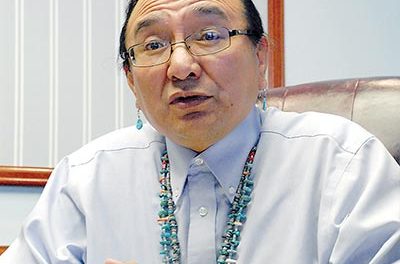
Former Navajo Nation President Jonathan Nez criticizes budget cuts and leadership silence
WINDOW ROCK
Former Navajo Nation President Jonathan Nez has strongly criticized recent federal staffing cuts, arguing they threaten public servants, Native American communities, and veterans.
In a statement released Saturday, Nez expressed concerns that these reductions – which he attributes to billionaire Elon Musk’s influence – violate constitutional norms and disproportionately impact tribal nations.
“These actions disregard long-standing norms, laws, and constitutional checks and balances,” Nez wrote, warning that the cuts will have serious consequences for Indian Country.
He specifically pointed to staffing reductions at the Indian Health Service, the Bureau of Indian Affairs, and the Department of Veterans Affairs, stating that they would hit families hard.
“My heart goes out to the career public servants who have fallen victim to Elon Musk’s chaotic firing spree, which likely violates the United States Constitution,” Nez said.
Nez emphasized that the budget cuts are not just financial decisions but a direct threat to the relationship between tribes and the federal government. He described the reductions as a disservice to the public and a failure to uphold treaty and trust obligations.
Nez further warned that these changes would affect the Navajo Nation, all tribal nations, and businesses working with tribes across the country.
Nez also aimed at several political figures for their silence on the cuts. He specifically criticized Congressman Eli Crane, who has positioned himself as a strong advocate for veterans but has not opposed the reductions.
“Eli Crane said he was going to fight for veterans, yet he enabled the current administration to drive up costs on average Americans—including veterans—and cut vital resources for them,” Nez wrote.
Nez also criticized the Nygren Administration and the 25th Navajo Nation Council, saying that while Indian Country faces these challenges, the Navajo Nation has remained silent.
“There is a void in leadership as the Nygren Administration boasts about befriending the same Washington, D.C. big shots who ignore our treaty guarantees,” Nez stated.
He directly questioned Navajo Nation President Buu Nygren’s leadership, suggesting that Nygren has prioritized building relationships with Washington officials over advocating for his people.
Nez framed the cuts as part of a larger political strategy to benefit billionaires at the expense of hardworking Americans.
“These cuts are a gross abuse of power, designed to pay for a massive tax giveaway to billionaires like Elon Musk,” he stated, calling for more decisive action from leaders.
Meanwhile, two senior lawmakers are urging the Department of Health and Human Services to lift a federal hiring freeze, which they say threatens health services for Native American and Alaska Native communities.
In a Feb. 10 letter to Acting HHS Secretary Dorothy A. Fink, Sen. Jeff Merkley (D-Ore.) and Rep. Chellie Pingree (D-Md.) said the Jan. 20 hiring freeze and workforce reductions violate Congressional directives and weaken the IHS.
“The hiring freeze and other workforce reductions impact the ability of IHS to provide essential medical services,” Merkley and Pingree wrote. “This decision further strains an agency already facing staff shortages.”
The lawmakers cited data showing nearly 2,000 vacant positions in IHS last year. A 2018 Government Accountability Office report found a 25% provider vacancy rate at IHS facilities, limiting access to emergency care, maternity services, and behavioral health programs.
Merkley and Pingree warned that tribal health facilities might be forced to cut services, affecting care for 2.8 million American Indians and Alaska Natives who rely on IHS.
Their letter also emphasized the federal government’s trust responsibility to tribal nations, urging Fink to reverse the hiring freeze and restore IHS staffing levels.
“The federal government must uphold its legal obligations to Native communities,” they wrote. “Health care access for millions of people is at risk.”
While Nez condemned what he called complacency, he praised Arizona Rep. Greg Stanton (D-4th District) for standing up for Indian Country. Nez contrasted Stanton’s advocacy with Crane and Nygren’s inaction, saying they had failed to oppose the cuts.
The Navajo Times attempted to reach President Nygren for comment, but he did not respond.
However, in a statement released on Friday, Nygren addressed concerns about a directive from the Office of Personnel Management related to the termination of probationary federal employees, including those in IHS, BIA, and the Bureau of Indian Education.
Nygren acknowledged that the directive raised concerns for the Navajo Nation, which depends on federal funding and workforce stability for critical services.
He said his administration is actively engaged with the Trump Administration to secure exemptions for essential personnel in IHS and BIE.
“President Trump has heard our concerns and has allowed for the exemption of many IHS and BIE workers, ensuring that these critical services continue without disruption, and we thank him,” Nygren said.
He admitted that not all positions were exempted but assured the Navajo people that his administration continues to advocate for restoring impacted jobs.
Nygren encouraged community members to reach out to his office for more information, emphasizing that protecting essential services remains a top priority for the Navajo Nation.
Nez concluded his statement by calling on Arizonans to push back against these cuts, urging communities to unite and fight for policies that support working families rather than benefiting billionaires.
“We must unite in common sense and stand up – Warrior Up – for our communities and the generations of Americans to come,” Nez wrote.







 Highway 264,
Highway 264, I-40, WB @ Winslow
I-40, WB @ Winslow